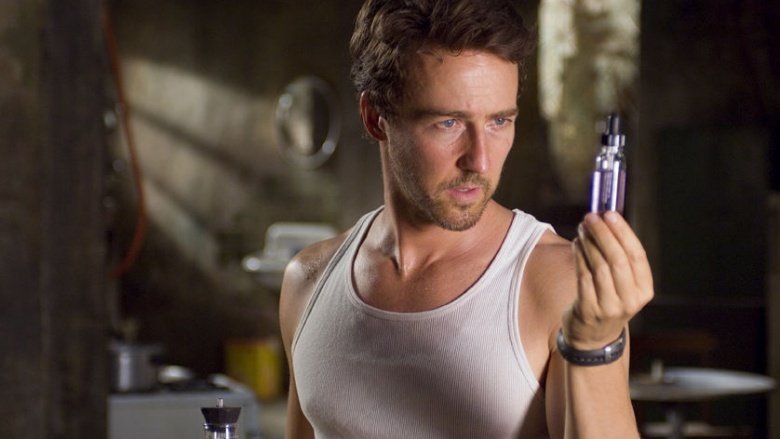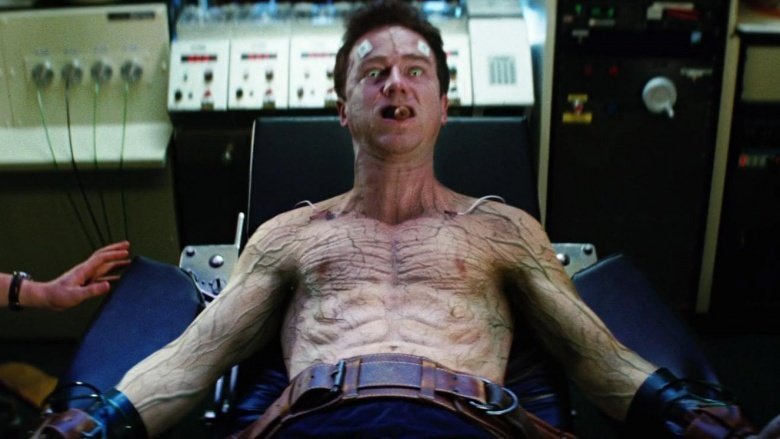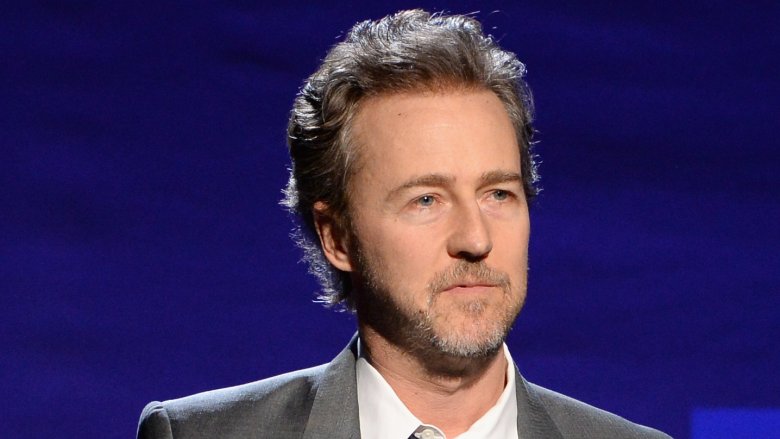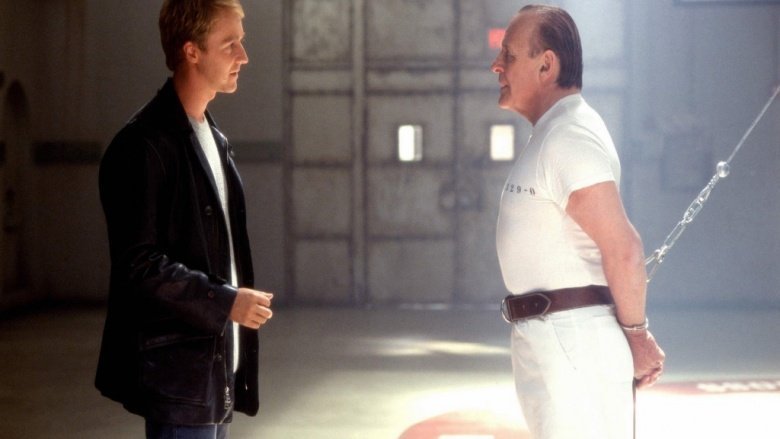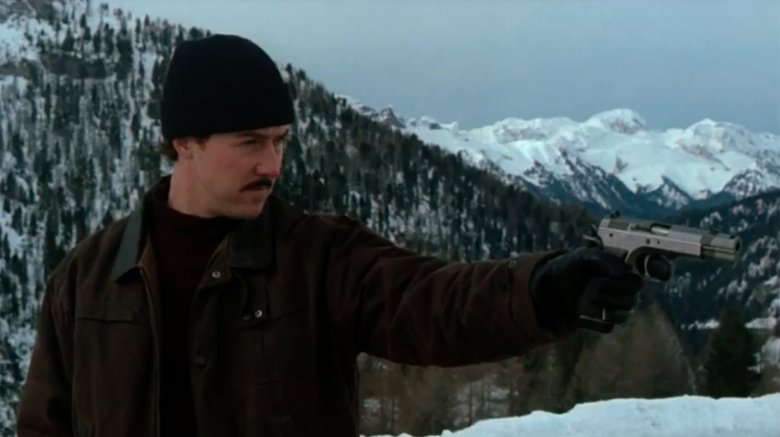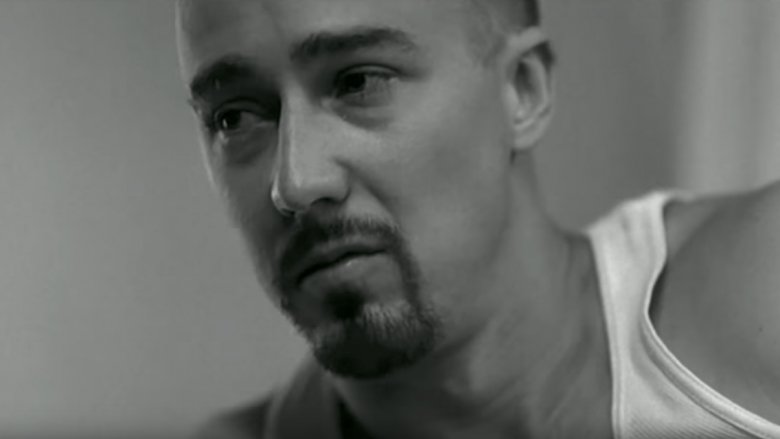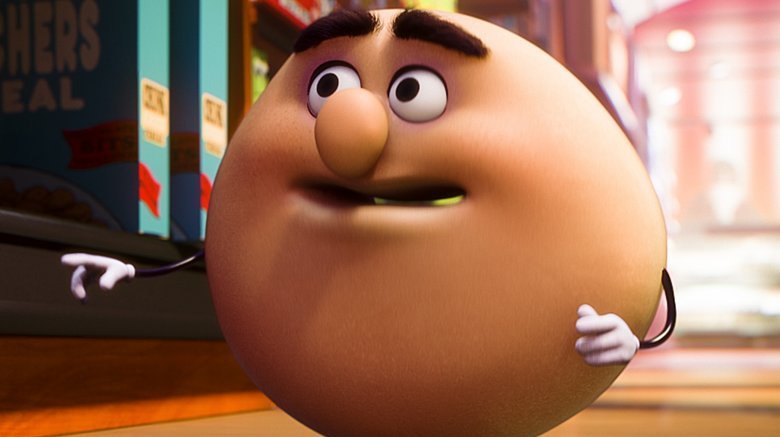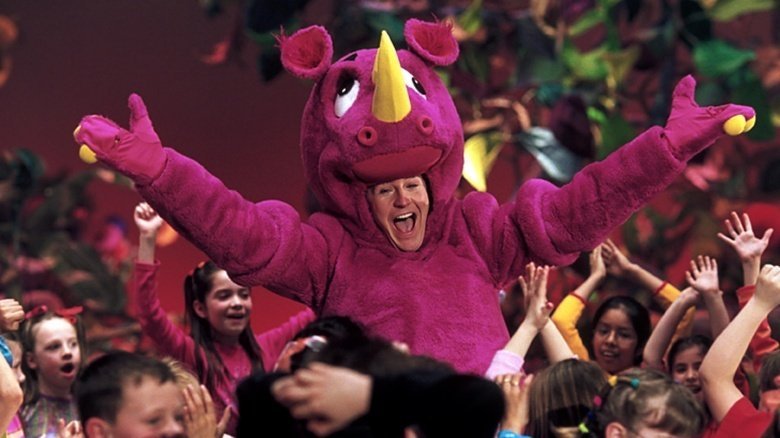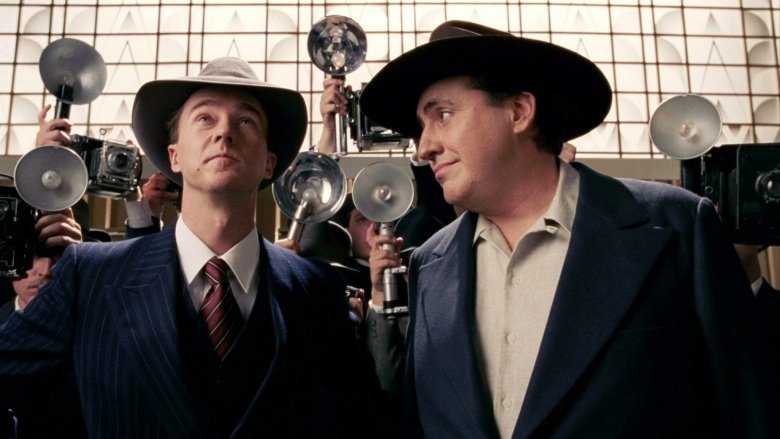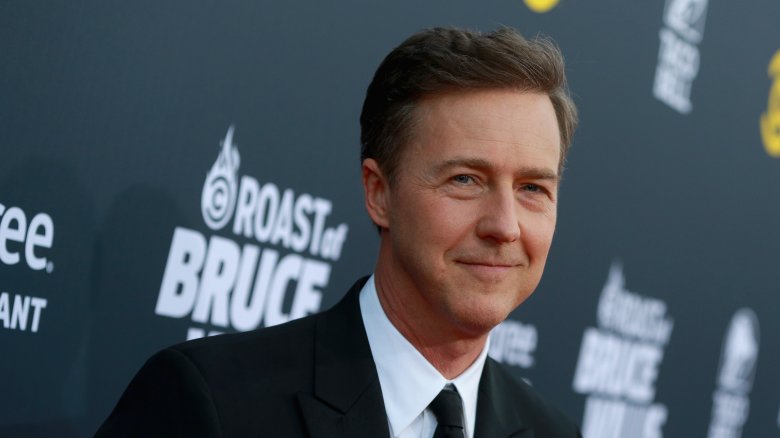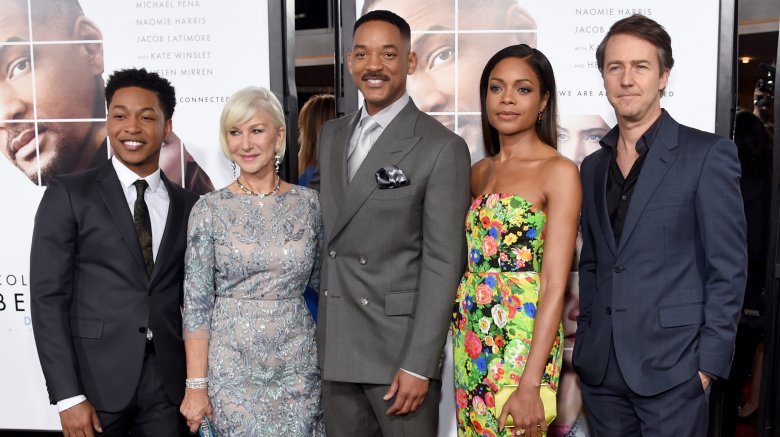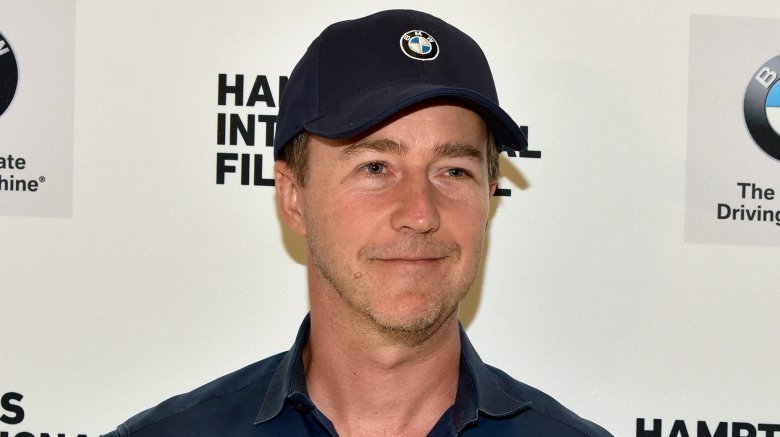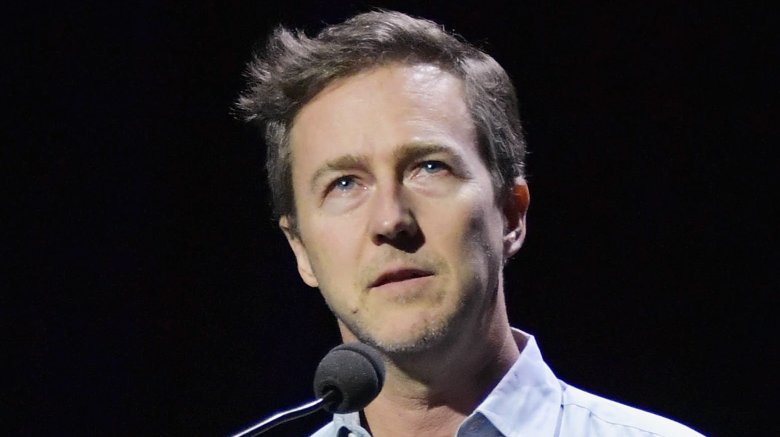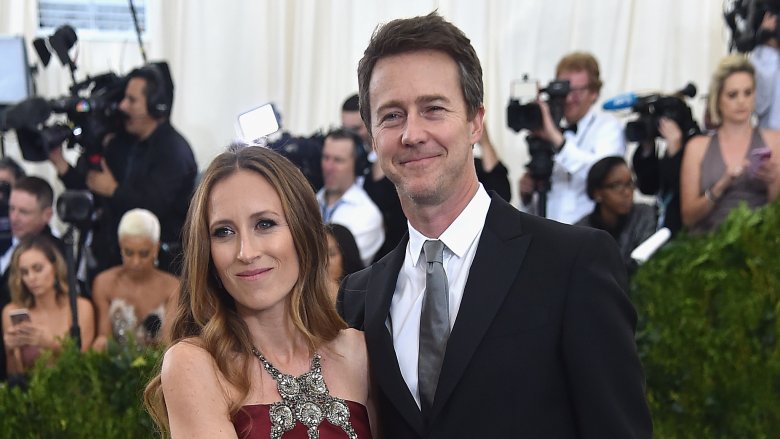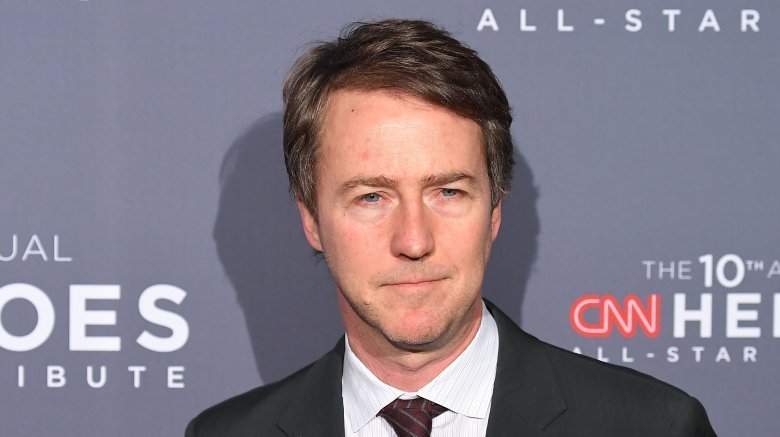Why Edward Norton Doesn't Get Many Movie Offers
Edward Norton earned his third Oscar nomination at the 2015 Academy Awards for his performance in Birdman. The movie, and Norton's role, blur the lines between reality and fiction. Michael Keaton — a former Batman — plays an actor trying to escape the shadow of a string of superhero movies. Norton plays a selfish, pretentious actor nobody wants to work with because he's so difficult. At least Norton has a sense of humor about his reputation — he's reportedly not the most easygoing guy on movie sets. That, and some of these other factors, are why Norton doesn't show up in movies all that often anymore.
Marvel didn't like him when he got angry
In 2008, Marvel Studios reacquired the rights to the Incredible Hulk from Universal, following the poorly reviewed 2003 Hulk. Marvel opted to reboot the franchise as The Incredible Hulk and hired Zak Penn (who'd co-written a couple of X-Men movies) to write the screenplay. The studio approached Norton to star, and after meeting with director Louis Leterrier, he signed on, provided any suggestions he made to Penn's screenplay be incorporated into the script.
Norton evidently did a substantial rewrite of the movie just weeks before filming started, and Leterrier shot as much of Norton's script as possible, along with Penn's, which resulted in a very messy, convoluted cut. Marvel executives hated the edit and ordered a new one, with more action and less dialogue and character development—the latter two were largely Norton's focus. Marvel so resented Norton's meddling that when it came time to bring the Hulk back to the big screen as part of The Avengers, the role was given to Mark Ruffalo. Studios almost never comment on why an actor is or isn't cast, but Marvel took the rare step of issuing a statement saying they wanted "an actor who embodies the creative and collaborative spirit of our other talented cast members." In short: they were sick of him and didn't want to deal with his shenanigans again.
He said he's not really into doing sequels
In a since-deleted 2010 Facebook post (via The Hollywood Reporter), Norton addressed Marvel's decision to re-cast the Hulk in The Avengers. "I sincerely hoped it could happen and be great for everyone," he wrote in part, "but it hasn't turned out as we all hoped."
Four years later, Norton drastically changed his tune. "I really, really enjoyed it," Norton said of The Incredible Hulk, adding, "And yet, I looked at the balance of time in life that one spends not only making those sorts of films but then especially putting them out, and the obligations that rightly come with that... I think you can sort of do anything once, but if you do it too many times, it can become a suit that's hard to take off, in other peoples' eyes." It's true — just look at how becoming Iron Man just absolutely destroyed Robert Downey Jr.'s career, right?
He tried to pull rank on the set of Red Dragon
During the filming of the 2002 Silence of the Lambs prequel Red Dragon, Norton showed up on set to film his scenes as FBI profiler Will Graham. He was apparently a little bit over-prepared, because in his hands were brand-new (and totally unsolicited) script pages that Norton had taken it upon himself to write. He also demanded that director Brett Ratner shoot them. Neither Ratner nor the film's producers took kindly to Norton's spontaneous and unwarranted script doctoring (to a screenplay by Academy Award-winner Ted Tally), and much professional arguing ensued. You can't blame Ratner or Red Dragon's producers, though — movie scenes have to be carefully planned out, budgeted, and storyboarded before filming ... not to mention how actors need to learn their lines and explore their characters beforehand, as well as the basic chain of command that makes a movie set run smoothly. Norton disrespected all of that, so you can see why everyone else was angry with him.
Paramount had to force him to do The Italian Job
In 1995, Paramount Pictures gave Edward Norton his first starring role as the diabolical genius Aaron Stampler in Primal Fear. Along with the role came a three-picture contract, leaving Norton obligated to star in two more Paramount-produced films. However, according to The Observer, Norton's star took off so quickly that he started taking roles elsewhere.
By 1997, Norton haggled his agreement down to "one future movie for Paramount" with the understanding that both parties "had 18 months to find a project they both liked. If they couldn't come to an agreement, the studio got another 24 months to assign Mr. Norton a project of their choice." Paramount eventually exercised their option to make Norton star in The Italian Job in 2002, and he pushed back. Both Norton and Paramount kept up a positive public face, but his lawyer, Marty Singer, claimed Paramount threatened to sue Norton if he declined the role, and so "rather than get involved in extensive litigation, [Mr. Norton] agreed to do the movie."
Singer added, "He wasn't looking to shirk his responsibility. He never said, 'I'm not going to do it.' He's just the kind of actor who will not do movies unless he feels strongly about them." Not surprisingly, Norton hasn't worked with the studio since.
The battle over the final cut of American History X
During the shoot for American History X, Norton and director Tony Kaye clashed often about character motivation and dialogue, but nothing major. Things got really bad during the editing phase, however — Kaye worked with film editors to create a tight 95-minute cut. When he saw it, Norton thought Kaye had removed too much of what they'd filmed, consequently ruining the movie.
Not wanting to upset their bankable star, the production company relented to Norton's demand that he make his own cut. That new edit, which clocked in at well over two hours, made it to film festivals and theaters. That really made Kaye mad — he even asked the Directors Guild to remove his name from the credits and replace it with "Humpty Dumpty," but his request was denied. (His $200 million lawsuit against the production didn't fly, either.) Kaye and Norton haven't worked together since — which probably has something to do with the 40 ads Kaye took out in trade papers eviscerating Norton, and that time he told a reporter the actor was "a narcissistic dilettante who raped the film."
He's working behind the scenes a lot
One of Norton's most recent roles came in Seth Rogen's deliriously profane animated movie Sausage Party, in which Norton voiced Sammy Bagel Jr., a bagel with a voice that sounded a lot like Woody Allen. The character — and his familiar-sounding voice — were actually Norton's idea.
As Rogen told Deadline, when he and collaborator Evan Goldberg came up with the idea for Sausage Party, Norton was one of the first people he told...and he was all in. "He really latched onto it, and was a huge proponent of it, and said from the very beginning that he wanted to play a bagel that sounded like Woody Allen," Rogen said. "He was like, 'If I've done my job properly, people won't know it's me until the end of the movie when they see my name in the credits.'"
Beyond playing a part in Sammy's characterization, Norton was instrumental in helping Sausage Party get produced, encouraging Rogen and Goldberg to proceed when the going got tough and convincing other big stars to voice characters in the movie, particularly Kristen Wiig and Salma Hayek.
He ticked off the wardrobe department on Death to Smoochy
It's not just studio bigwigs, producers, writers, and directors that Norton will go toe-to-toe with: he'll even clash with the costume department if he has to. During production of the 2002 dark comedy Death to Smoochy, the film's costume designer, Jane Ruhm, presented Norton with a wide variety of clothes for his character, a laid-back children's show host — for when he wasn't dressed in a giant pink rhino costume, that is. Ruhm's sartorial selections befitted that of the hippie-type character described by the film's shooting script, but without Ruhm's knowledge — or anyone else's approval, apparently — Norton commissioned the legendarily fancy Armani fashion house to design him the ultimate in hippie chic: a suit made of actual hemp. Then, to top it all off, he apparently forced Ruhm to deal with all the paperwork and negotiations associated with getting such a suit made and sent to set.
He called out the Writers Guild over his Frida script
In Frida, the 2002 biopic about legendary Mexican artist Frida Kahlo, Norton played Nelson Rockefeller, the billionaire who commissioned Kahlo's husband, Diego Rivera, to paint a mural in New York's Rockefeller Center. Norton's then-girlfriend, Salma Hayek, starred as Kahlo, and Frida was her passion project—she'd been trying to get the movie made for years. She obviously wanted to get every detail perfect, so even though the writers turned in a fine screenplay, Hayek wasn't satisfied. She asked Norton to conduct more research on Kahlo and use whatever information he found to extensively rewrite the Frida screenplay.
Norton did just that, and despite claiming that he wrote the movie, he was denied credit by the Writers Guild—an organization of which he was not a member at the time. An angered Norton trashed them in the press—while doing interviews for Red Dragon, Norton told a reporter, "I got shafted by the Writers Guild at the last minute, but I wrote the draft that got made."
He roasted Marvel
Norton made a relatively rare televised appearance in the summer of 2018, showing up for the taping of The Comedy Central Roast of Bruce Willis. As one does at a roast, Norton took some pretty harsh jabs at Willis, his Moonrise Kingdom co-star. For example: "I tried to emulate you in American History X. I shaved my head, I acted like a racist," Norton joked. "It's probably the closest any actor has come to being you in a film, and I got nominated for a Best Actor [Oscar]." Ouch.
But much of Norton's routine was just a set-up to attack who the actor really wanted to insult: the Marvel Cinematic Universe, and the people who make those movies. "I tried to be like you," Norton said, in regards to Willis. "I did a big action movie called The Incredible Hulk. You know what went wrong? I wanted a better script. I thought we should try to make one Marvel movie that was as good as the worst Chris Nolan movie, but what the hell was I thinking?"
His last big movie was a major bomb
Norton's most recent major live-action role came in the 2016 drama Collateral Beauty. A quirky film with spiritual themes, it's about an advertising executive named Howard Inlet (Will Smith) who, after suffering a devastating personal loss, writes letters to the concepts of Love, Time, and Death. Norton portrayed a guy named Whit, a business associate of Howard's in the star-studded film, which also featured Keira Knightley, Kate Winslet, Naomie Harris, Ann Dowd, and Helen Mirren.
While that stellar cast lent the movie some pre-release Oscar buzz, Collateral Beauty flopped hard, earning a mere $31 million in the U.S., and had the misfortune of opening the same weekend as mega-smash Rogue One. Critics liked it even less than audiences—it amassed just 13 percent on Rotten Tomatoes. Although Norton wasn't singled out by critics as one of the movie's major problems, Collateral Beauty definitely wasn't the comeback vehicle for Norton that it could have — and should have — been.
He's a producer
He may have receded from the spotlight, but Norton has stayed busy on the production side. He's a producer on Lewis & Clark, a long-gestating HBO miniseries about the famous explorers who trudged through the Louisiana Purchase at the dawn of the 19th century.
Based on historian Stephen Ambrose's landmark book Undaunted Courage: Meriwether Lewis, Thomas Jefferson, and the Opening of the American West, filming on the project began in June 2015, before abruptly shutting down just two months later. Among the other problems facing the miniseries: director and co-writer John Curran quit, and there were script issues. As Norton has done on previous troubled projects, he took a pass at the script; his version was abandoned in favor of one written by Master of Sex creator Michelle Ashford. The six-part series, which stars Casey Affleck and Matthias Schoenaerts as Lewis and Clark, respectively, still doesn't have a release date several years after HBO announced it was redeveloping the project.
He's calling the shots again
In the last 20 years, Norton has starred in many films, but he's only directed one: Keeping the Faith, a 2000 romantic comedy about a Catholic priest (Norton) and a rabbi (Ben Stiller) fighting over a woman (Jenna Elfman). Norton recently returned to directing, with Motherless Brooklyn, a 1950s-set drama about a New York private detective with Tourette's syndrome trying to solve the murder of his mentor. Norton, who wrote the screenplay based on Jonathan Lethem's novel of the same name, will also play the detective; Bruce Willis co-stars as the mentor. Other notable actors rounding out the cast include Alec Baldwin and Willem Dafoe, so this one could be a pretty big deal upon its 2019 release.
It sometimes seems like Norton can't make a movie without a little controversy, and Motherless Brooklyn is par for the course. While shooting a scene in a Harlem apartment building in March 2018, a fire broke out in the basement. Tenants George and Erica Cruz saw their apartment destroyed, and sued Norton's company for "recklessness, carelessness, and negligence" for bringing flammable film equipment into the building, and then failing to properly inform the tenants about the fire. The blaze also claimed the life of firefighter Michael Davidson, and Norton's company faces a wrongful death lawsuit, filed by Davidson's family.
He intentionally slowed down to focus on family
Though he's normally cagey about discussing his personal life with the press — he even declined to issue a statement confirming his son's birth in March 2013 — Norton opened up to the Independent about his conscious decision to take a step back from acting.
In discussing why he's become "more choosy about the choice of roles," Norton cited "personal life, family life," and the desire to strike a balance between acting and "other things that are really compelling or interesting or challenging to a different part of your brain or your personality." Of course, the conversation also turned into a classic Norton critique of the film industry as a whole. "I just think that I'm less interested than I used to be in, like, exploring genre for the sake of it," he said, adding, "I've... gotten more willing to wait for things that feel really strong as an attempt to make an original piece, or are expressing something that is really unique, or [are from] a film-maker that I really admire like Wes Anderson, or Alejandro Inarritu or Spike Lee."
In other words: don't call him, Hollywood, he'll call you.
What's next for Edward Norton
Even those actors who may not be as visible as they once were still usually have at least a couple of projects in the pipeline — minor roles in independent movies, a TV series pilot, or guest-starring gig on an obscure cable drama or two. But Edward Norton doesn't seem to have much going on, either right now or in the works for the immediate future. IMDb lists just one significant acting credit for Norton in 2018: voicing a dog named Rex in Isle of Dogs, a stop-motion animated effort directed by Wes Anderson, with whom Norton previously worked in the live-action features Moonrise Kingdom and The Grand Budapest Hotel. In 2019, Edward Norton landed the starring role in Motherless Brooklyn, a movie he also wrote and directed, as well as a cameo on Alita: Battle Angel. Here's hoping we'll see a little bit more of Norton in the years to come.
